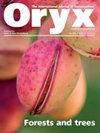First Red List of Ecosystems assessment of a tropical glacier ecosystem to diagnose the pathways towards imminent collapse
IF 2.1
3区 环境科学与生态学
Q2 BIODIVERSITY CONSERVATION
引用次数: 0
Abstract
Tropical glaciers are rapidly disappearing, particularly in isolated mountain peaks below 5,000 m elevation. These glaciers are fundamental substrates for unique cryogenic ecosystems in high tropical environments where the ice, melting water and rocky substrate sustain microbiological communities and other meso- and macro-biota. This study uses the Red List of Ecosystems guidelines to diagnose the collapse of the tropical glacier ecosystem of the Cordillera de Mérida, Venezuela. We undertook the assessment with existing estimates of glacier ice extent, indirect historical estimates of ice mass balance and global mechanistic models of future ice mass balance. We complemented these with additional statistical analysis of trends and bioclimatic suitability modelling to calculate and predict rates of decline and relative severity of degradation in selected ecosystem indicators. The evidence suggests an extreme risk of collapse (Critically Endangered) because of a prolonged and acute reduction in ice extent and changes in climatic conditions that are leading to the complete loss of ice mass. The ice substrate has declined 90% in the last 20 years, and observed acceleration of the rate of decline suggests it will probably disappear within the next 5 years. Loss of ice substrate will trigger an immediate loss of supraglacial, englacial and subglacial biotic compartments and initiate a decades-long succession of forefield vegetation. However, ongoing inventories of native biota and monitoring of ecosystem transitions can provide valuable insights and lessons for other ecosystems facing similar risks. The Red List of Ecosystems assessment protocol provides a useful framework for comparative analysis of cryogenic ecosystems.首次对热带冰川生态系统进行生态系统红色名录评估,诊断濒临崩溃的途径
热带冰川正在迅速消失,尤其是在海拔 5000 米以下的孤立山峰。这些冰川是热带高海拔环境中独特的低温生态系统的基本基质,冰、融水和岩石基质维持着微生物群落和其他中生代和大型生物群落。本研究利用生态系统红色名录指南来诊断委内瑞拉梅里达科迪勒拉热带冰川生态系统的崩溃情况。我们利用现有的冰川冰面范围估计值、冰质量平衡的间接历史估计值以及未来冰质量平衡的全球机理模型进行了评估。作为补充,我们还对趋势进行了额外的统计分析,并建立了生物气候适宜性模型,以计算和预测选定生态系统指标的下降率和退化的相对严重程度。有证据表明,由于冰层范围长期急剧缩小,气候条件发生变化,导致冰量完全丧失,因此极有可能崩溃(极度濒危)。在过去的 20 年中,冰层基质减少了 90%,而观察到的冰层基质减少速度加快表明,冰层基质很可能在未来 5 年内消失。冰底质的消失将立即导致冰上、冰川和冰川下生物区块的消失,并引发长达数十年的前场植被演替。然而,对本地生物群的持续清查和对生态系统过渡的监测,可以为面临类似风险的其他生态系统提供宝贵的见解和经验。生态系统红色名录评估协议为低温生态系统的比较分析提供了一个有用的框架。
本文章由计算机程序翻译,如有差异,请以英文原文为准。
求助全文
约1分钟内获得全文
求助全文
来源期刊

Oryx
环境科学-生态学
CiteScore
5.30
自引率
7.40%
发文量
150
审稿时长
18-36 weeks
期刊介绍:
ORYX—THE INTERNATIONAL JOURNAL OF CONSERVATION, a quarterly journal from Fauna & Flora International, publishes research on biodiversity conservation, conservation policy and sustainable use, and the interactions of these matters with social, economic and political issues. The journal has a particular interest in material with the potential to improve conservation management and practice. Explore the map for details of published articles.
 求助内容:
求助内容: 应助结果提醒方式:
应助结果提醒方式:


